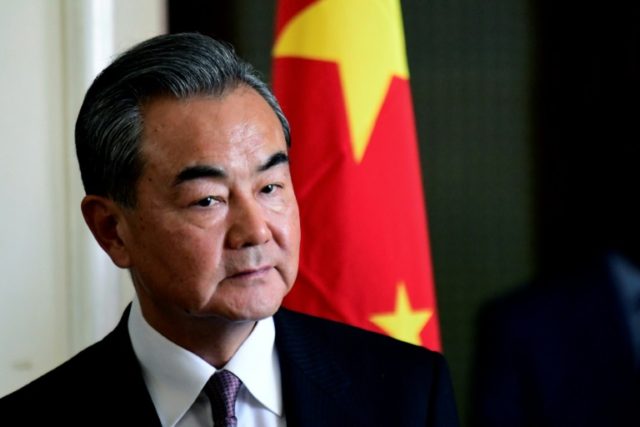Chinese Foreign Minister Wang Yi previewed the third annual Belt and Road Forum by defending China’s infrastructure plan on Friday as a constructive program, rather than the string of debt traps depicted in U.S. criticism.
He prodded the U.S. to stop interfering with Belt and Road by persuading prospective members to back away from the project.
“The Belt and Road Initiative is not a geopolitical tool but a platform for cooperation. We welcome all parties to take part in it,” said Wang.
“All countries have the freedom to participate, but they don’t have the right to prevent other countries from taking part. We hope that more countries, including the United States, can actively participate in the Belt and Road Initiative,” he said.
The South China Morning Post noted the United States and India were conspicuous exceptions to the expansive list of foreign leaders attending the Belt and Road Forum, which begins next Thursday:
The upcoming three-day conference, which opens on Thursday, is expected to attract about 40 foreign leaders – up from 29 at the inaugural summit in 2017 – and 5,000 foreign representatives from 150 countries.
[…]
Among those expected to attend next week’s summit are Russian President Vladimir Putin, Pakistani Prime Minister Imran Khan, the 10 Asean (Association of Southeast Asian Nations) heads of state, and the leaders of Italy, Austria, Switzerland, France, and several African and Central Asian countries.
The United States will send only low-level representatives – mostly state-level officials and business representatives – to the event while India has refused to attend in part because of a China-led belt and road project in Pakistan that passes through the Pakistan-administered section of the disputed Kashmir region.
India is also angry at China for protecting the leader of the Pakistan-based terrorist organization held responsible for deadly attacks in Kashmir and worried that China will use Belt and Road to encircle and isolate it, not only through trade and politics but by taking control of ports and highways that could be used by Chinese military forces.
Belt and Road looked to be running into a bit of trouble over the past year, but on Friday the South China Morning Post reported some wavering participants such as Malaysia and Pakistan have climbed back on board, sometimes with reduced commitments and smaller infrastructure projects.
Malaysia’s decision to resume work on a stalled-out property development project was seen as particularly good P.R. for China going into the Belt and Road Forum. A high-speed rail line that was to be part of the development plan is still suspended but could be reactivated in the future.
The Chinese are recovering from a bad Belt and Road year by adjusting their sales pitch, promising more transparency – although still far less than a full and honest partnership would provide – and renegotiating deals to give more of the work to local contractors instead of Chinese companies.
Chinese officials have lashed out at Western critics of their infrastructure plan, accusing them of lacking “objectivity,” “misunderstanding” the program, and even displaying racial prejudice towards the Chinese.
Another huge victory for China on the eve of the annual form was Italy joining Belt and Road in March, the largest economy to plug into the program to date. The exact details of Italy’s participation have not been made public yet, so major announcements at the forum are a possibility.
With designs on pushing further into Europe, China has asked for Britain’s help in addressing charges that Belt and Road projects are opaque, risky to national sovereignty, and slanted towards Chinese companies. U.K. Chancellor Philip Hammond is scheduled to attend the forum next week.
China invited North Korea to attend the Belt and Road Forum this year. The delegation from Pyongyang might include dictator Kim Jong-un. Wang said North Korea’s participation would be “very normal” because “it is an economic cooperation initiative” and repeated his warning that no country has the right to “prevent others from participating.”

COMMENTS
Please let us know if you're having issues with commenting.